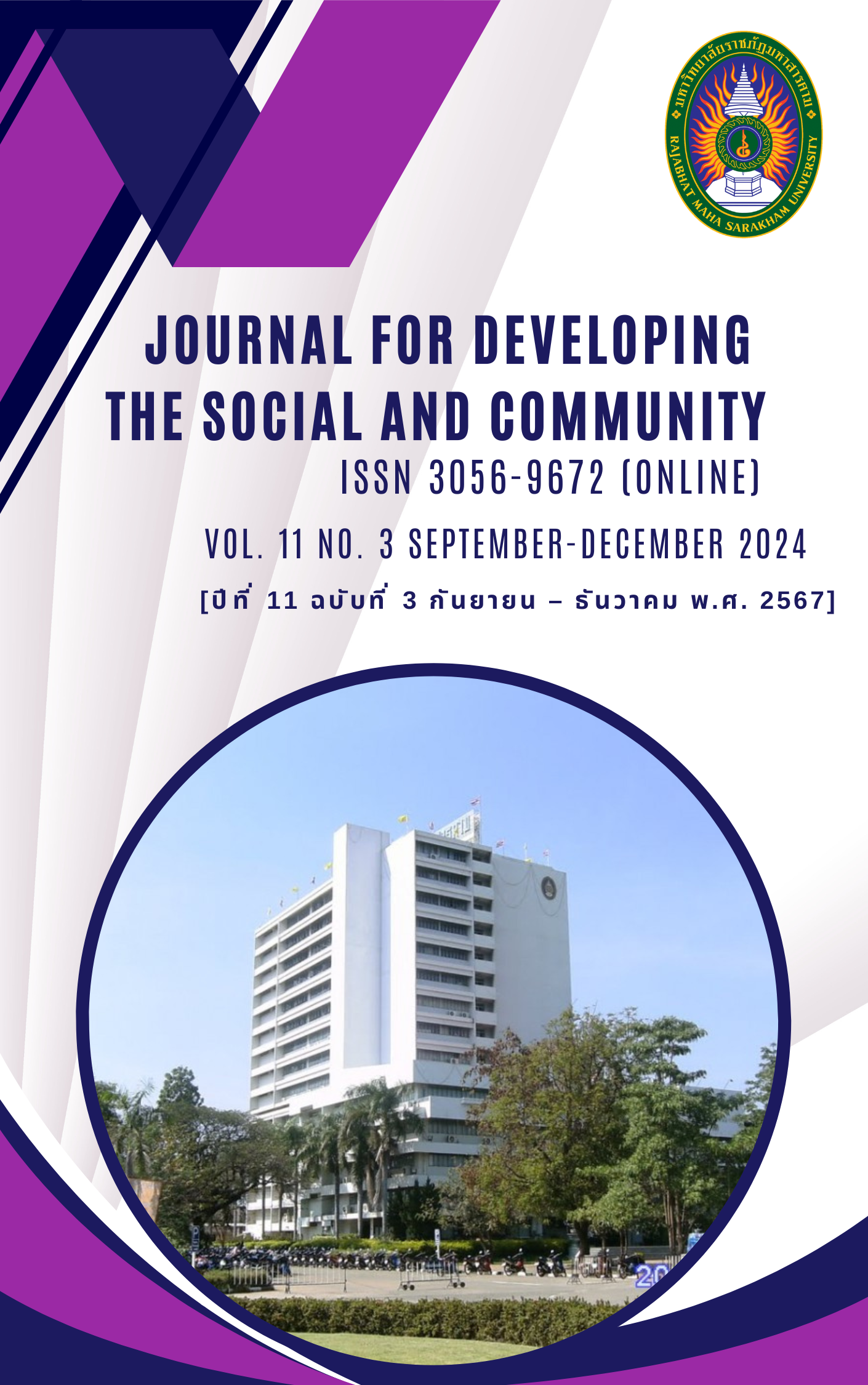การพัฒนากิจกรรมการเรียนรู้วิทยาศาสตร์ เรื่องสารและสมบัติของสาร ที่ส่งเสริมความสามารถในการแก้ปัญหา สำหรับนักเรียนชั้นประถมศึกษาปีที่ 6
คำสำคัญ:
กิจกรรมการเรียนรู้, ความสามารถในการแก้ปัญหา, ผลสัมฤทธิ์ทางการเรียนบทคัดย่อ
การวิจัยนี้มีวัตถุประสงค์เพื่อ พัฒนาการกิจกรรมการเรียนรู้วิทยศาสตร์ ที่ส่งเสริมความสามารถในการแก้ปัญหา เรื่องสารและสมบัติของสาร สำหรับนักเรียนชั้นประถมศึกษาปีที่ 6 โดยดำเนินการวิจัยเป็น 3 ระยะ คือ ระยะที่ 1 ศึกษาแนวทางการจัดกิจกรรมการเรียนรู้วิทยาศาสตร์ที่ส่งเสริมความสามารถในการแก้ปัญหา ระยะที่ 2 พัฒนาการจัดกิจกรรมการเรียนรู้วิทยาศาสตร์ ที่ส่งเริมความสามารถในการแก้ปัญหา เรื่องสารและสมบัติของสาร สำหรับนักเรียนชั้นประถมศึกษาปีที่ 6 ระยะที่ 3 ทดลองใช้กิจกรรมการเรียนรู้วิทยาศาสตร์ ที่ส่งเริมความสามารถในการแก้ปัญหา เรื่องสารและสมบัติของสาร สำหรับนักเรียนชั้นประถมศึกษาปีที่ 6 กลุ่มที่ศึกษา ได้แก่ นักเรียนชั้นประถมศึกษาปีที่ 6 โรงเรียนชุมชนบ้านโพธิ์สองห้องวิทยา ในภาคเรียนที่ 2 ปีการศึกษา 2565 จำนวน 18 คน เครื่องมือที่ใช้ในการวิจัย ได้แก่ 1) แบบสัมภาษณ์ 2) แผนการจัดกิจกรรมการเรียนรู้ 3) แบบทดสอบวัดผลสัมฤทธิ์ทางการเรียน จำนวน 30 ข้อ มีความยากตั้งแต่ 0.43 – 0.67 อำนาจจำแนกตั้งแต่ 0.36-0.63 และความเชื่อมั่น 0.97 4) แบบทดสอบวัดความสามารถในการแก้ปัญหา จำนวน 24 ข้อ มีความยากตั้งแต่ 0.33-0.77 อำนาจจำแนกตั้งแต่ 0.23 - 0.47 และความเชื่อมั่น 0.86 5) แบบสอบถามความพึงพอใจต่อการจัดการเรียนรู้ สถิติที่ใช้ในการวิเคราะห์ข้อมูลได้แก่ ค่าเฉลี่ย ส่วนเบี่ยงเบนมาตรฐาน ร้อยละ และการทดสอบทีแบบกลุ่มไม่อิสระ ผลการวิจัยปรากฏดังนี้
1) กิจกรรมการเรียนรู้วิทยาศาสตร์ที่ส่งเสริมความสามารถในการแก้ปัญหา เรื่องสารและสมบัติของสาร สำหรับนักเรียนชั้นประถมศึกษาปีที่ 6 ประกอบด้วย 4 แผนการจัดการเรียนรู้ โดยกิจกรรมการเรียนรู้มี 6 ขั้นตอน คือ (1) ขั้นกำหนดปัญหา (2) ทำขั้นทำความเข้าใจปัญหา (3) ขั้นดำเนินการศึกษาค้นคว้า (4) ขั้นสังเคราะห์ความรู้ (5) ขั้นสรุปและประเมินค่าของคำตอบ และ (6) ขั้นนำเสนอและประเมินผลงาน มีความเหมาะสมอยู่ในระดับมาก 2) นักเรียนที่ได้รับการจัดการเรียนรู้โดยใช้กิจกรรมการเรียนรู้วิทยาศาสตร์ที่ส่งเสริมความสามารถในการแก้ปัญหามี ผลสัมฤทธิ์ทางการเรียน เรื่องสารและสมบัติของสาร หลังเรียนสูงกว่าก่อนเรียน อย่างมีนัยสำคัญทางสถิติที่ระดับ .01 3) นักเรียนที่ได้รับการจัดการเรียนรู้โดยใช้กิจกรรมการเรียนรู้วิทยาศาสตร์ที่ส่งเสริมความสามารถในการแก้ปัญหา มีความสามารถในการแก้ปัญหา เรื่องสารและสมบัติของสารหลังเรียนสูงกว่าก่อนเรียน อย่างมีนัยสำคัญทางสถิติที่ระดับ .01 4) นักเรียนมีความพึงพอใจต่อการจัดการเรียนรู้วิทยาศาสตร์ที่ส่งเสริมความสามารถในการแก้ปัญหาอยูในระดับมากที่สุด
เอกสารอ้างอิง
Amornwiwat, S. (1998). "Do we have to reform learning?" in Reform according to 5 theories. Bangkok: Idea Square.
Arunsukrujee, K. (2003). Cooperative members' satisfaction with the operations of Chaiyapra Agricultural Cooperative Limited. Chai Prakan District, Chiang Mai Province. Thesis, M.Sc. Chiang Mai: Chiang Mai University.
Duangdeewong, W. (2018). Development of academic achievement and problem-solving thinking about materials and their properties. with problem-based learning activities For Grade 5 students. Master of Education Thesis. (science teaching). Chonburi : Burapha University.
Gagne, R. M. (1970). The conditions of learning. (2nded.). Holt, Rinehart & Winston.
Herzberg, F. (1959). The human problem of management. Englewood Cliffs, CA: Thomson/ Wadsworth.
Hmelo, C.E. & Evensen, Dorothy H. (2000). Problem-Based Learning: Gaining Insights on Learning Interactions Through Multiple of Inquiry. Mahwah, New Jersey: Lawrence Erlbaum Associates.
Joyce, B & Weil, M. (1992). Model of Teaching. (3rded). New Jersey: Prentice Hall International, Inc.
Ketkarn, P. (2015). Results of problem-based learning management to develop academic achievement. Science subject Problem solving ability and scientific attitude of students in grade 6. Master of Education Thesis (Curriculum and teaching). Chonburi: Graduate School.
Khaemmanee, T. (2002). Teaching formats: various options. Bangkok: Chulalongkorn University Press.
Nuengchalerm, P. (2015). Learning science in the 21st century. Bangkok: Chulalongkorn University Press.
Office of the National Education Commission. (2002). Office of Educational Policy, Planning and Standards. Religion and culture National Education Plan (2002-2016): Summary edition. (2nded). Bangkok: Phrikwan Graphics Co., Ltd. (In Thai)
Risser, N.L. (1975). Development of an instrument to measure patient satisfaction with nurses and nursing care in primary care setting. Nursing Research, 24 (1), 45-51.
Sansern, C. (2017). Development of learning ability in science subjects. Using problem-based learning of students in grade 5. Master of Education Thesis. (Curriculum and teaching). Bangkok : College of Education Dhurakij Pundit University.
Secretary-General of the Education Council. (2007). Problem-based learning management. Bangkok: Office of the Secretary-General of the Education Council.
Sinthapanon, S., et al. (2012). Develop thinking skills according to educational reform guidelines. Bangkok: Printing Techniques.
Suthirat, C. (2010). Techniques for using questions to develop thinking. Nonthaburi : Sahamit Printing and Publishing.
Wong-iam, S. (2015). Development of academic achievement and the ability to think and solve scientific problems in the Biology subject: Living things and the environment of Mathayom 4 students. Master of Education Thesis Field of study of science teaching. Chonburi: Faculty of Education Burapha University.
Worakham, P. (2022). Educational Research. (13rd ed.). Maha Sarakham : Taxila Printing.
ดาวน์โหลด
เผยแพร่แล้ว
รูปแบบการอ้างอิง
ฉบับ
ประเภทบทความ
สัญญาอนุญาต
ลิขสิทธิ์ (c) 2024 Journal for Developing the Social and Community

อนุญาตภายใต้เงื่อนไข Creative Commons Attribution-NonCommercial-NoDerivatives 4.0 International License.
บทความที่ได้รับการตีพิมพ์เป็นลิขสิทธิ์เป็นของผู้ประพันธ์บทความ







